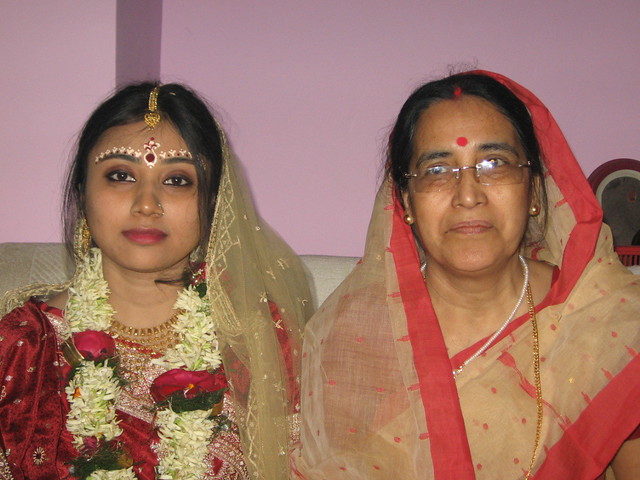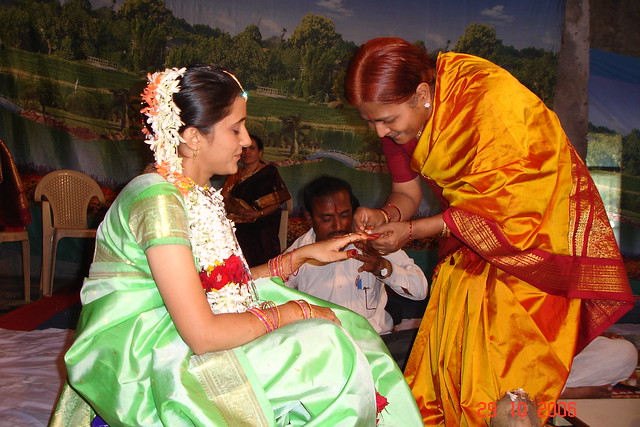Oh yes. That eternally perplexing question of married Indian women, “How to deal with mother-in-law?”
Before we dive into this explosive topic, here are a few disclaimers. ;)
Disclaimer 1: This is not about all mothers-in-law. Only the kind which made you google “How to deal with mother-in-law”. :D
Disclaimer 2: If you’re a guy, this is not about your mother but the mothers of all those other married men you know. :P You can skip today’s post – and refer your wife/girlfriend to it instead. ;)
How to deal with mother-in-law – Rule 1. Familiarize
The first and most important step you can take to improve your relationship with your mother-in-law is to spend ample time with her before marriage, both in the presence and absence of your fiancé. I’d recommend you start interacting regularly with her at least a year prior to your marriage. Go shopping with her, watch a movie with her or accompany your boyfriend’s family on a holiday at home/day trip. This will ensure the two of you get to know each other in a relaxed, no-pressure environment and set expectations accordingly.
How to deal with mother-in-law – Rule 2. Detach yourself
Irrespective of how much you like or don’t like your mother-in-law, you may not always be in a position to choose how much you interact with her. In such a situation you need to deal with your mother-in-law in a way that’s healthy to both of you. And the first step to that is to detach yourself emotionally.
- Do not try to look upon her as your “other mother”. That perspective is guaranteed to lead to shock & disappointment. Not necessarily because of any fault of hers, but because our parents are our parents. Expecting an in-law to be “like them” is unfair to the in-law.
- Let go of unrealistic expectations from her. There would be aspects of her you won’t like. Do not expect her to change.
- Look upon her as an acquaintance, a bit like a professional contact – someone you do not need to like as a person but still need to treat with respect.
 Photo by Daljeet Mayn
Photo by Daljeet MaynHow to deal with mother-in-law – Rule 3. Boundaries
Define clear boundaries of what is acceptable and what is not, both for her and yourself (if required, also for your husband). Once you’ve committed to certain boundaries, it’s your utmost responsibility to honour your side of them.
Do not discuss these boundaries directly with her – coming from an earlier generation she might misunderstand. Agree on them with your spouse instead.
Boundaries should be objective and specific. For example, “I guarantee I’ll treat her with respect at all times, irrespective of her own behaviour. In return I must have the guarantee that she’d not stay with us for more than xyz days/weeks per year/month.” Note the level of objectivity in the condition. Do not accept a boundary condition from her side that is open to interpretation, e.g. “She should treat me with respect.”
How to deal with mother-in-law – Rule 4. Show respect
You don’t need to like her as a person but keep your judgements to yourself. By virtue of your relationship, she deserves respectful treatment from you, just as you deserve respectful treatment from her. Maintain your distance but treat her with respect, even if she does not return the favour. Sounds like a typical Indian male chauvinist from the 19th century speaking? :D Read on to find out why.
How to deal with mother-in-law – Rule 5. Safety first
I suggest you refrain from showing anything but respect to her not because I believe that’s the “right” thing to do irrespective of circumstances, but because I want you to steer clear of the consequences of doing otherwise. For example if her verbal remarks hurt you and you retort, she’s likely to talk to your husband about it. When she does, you’ll have no ways to prove that you were “provoked”. It will become a subjective battle of your words against hers and no one ever wins those. So the key is to not give her any opportunity whatsoever of badmouthing you to your husband.
 Photo by abhishek_815
Photo by abhishek_815How to deal with mother-in-law – Rule 6. Don’t be a punch-bag
Does this mean you should become meek and accept everything your mother-in-law does? No. A funny thing about human emotions is that, when people attack others they expect response, and feel powerless if there’s none. If you feel your mother-in-law is deliberately trying to disturb you, your strongest defence is a complete refusal to respond.
This does not mean you patiently tolerate everything she says or does without protest. That will give her the impression that you accept her position of superiority. If she says/does anything so provocative that you feel unable to control yourself, excuse yourself (tell her you’re suddenly feeling unwell or something) and leave the room.
How to deal with mother-in-law – Rule 7. Assert yourself
Even if you don’t protest against her not-so-friendly actions, your mere refusal to be a punch-bag might come across as an insult to her. In case she discusses this with your husband and you find yourself facing accusations from him, you need to assert yourself. Tell him these exact words: “It’s not within my rights to treat others with disrespect in my interactions with them. But it is within my rights to decide who I interact with and how much, right? I left the room because certain things she said made me feel bad, and I didn’t want to hurt her by protesting. You’re not telling me that part of my responsibility is to willingly let her hurt me, are you?” No self-respecting man worth his salt would say a “yes” to this. (If he does, you’ve married the wrong man. Flash him your most charming smile and say “Goodbye.” :D)
How to deal with mother-in-law – Rule 8. Don’t try “ideal”
Does your mother-in-law unwittingly set unrealistic standards for you? Do her criticisms make you feel like you can never be “good enough”? For example, are you made to feel like you’re never doing “enough” of the household chores, or “adjusting” enough, or showing her enough respect? If you let yourself be affected by others’ perceptions of you, you might be eroding away your self-esteem dangerously. She’s entitled to her views. But you’re extraordinary the way you are, and how you compare with her idea of the “ideal daughter-in-law” is in no way a measure of your worth as a human being. So do not try to change yourself to earn her (or anyone else’s) approval. Go back to point #3 and let go of the rest.
How to deal with mother-in-law – Rule 9. Distance yourself
If possible, don’t live with your parents-in-law. They can be the nicest people ever but everyone needs personal space. Sharing yours with someone who’s not immediate family/partner but holds a purported position of authority is almost certain to create some degree of stress, even if it is not verbalized. If anecdotal evidence is anything to go by, moving out of the family home almost always leads to an improvement in the relationship between a woman and her in-laws.
How do you deal with your mother-in-law? Are you one of those lucky daughters-in-law with a nice and friendly mother-in-law? Do let us know by leaving a comment.












